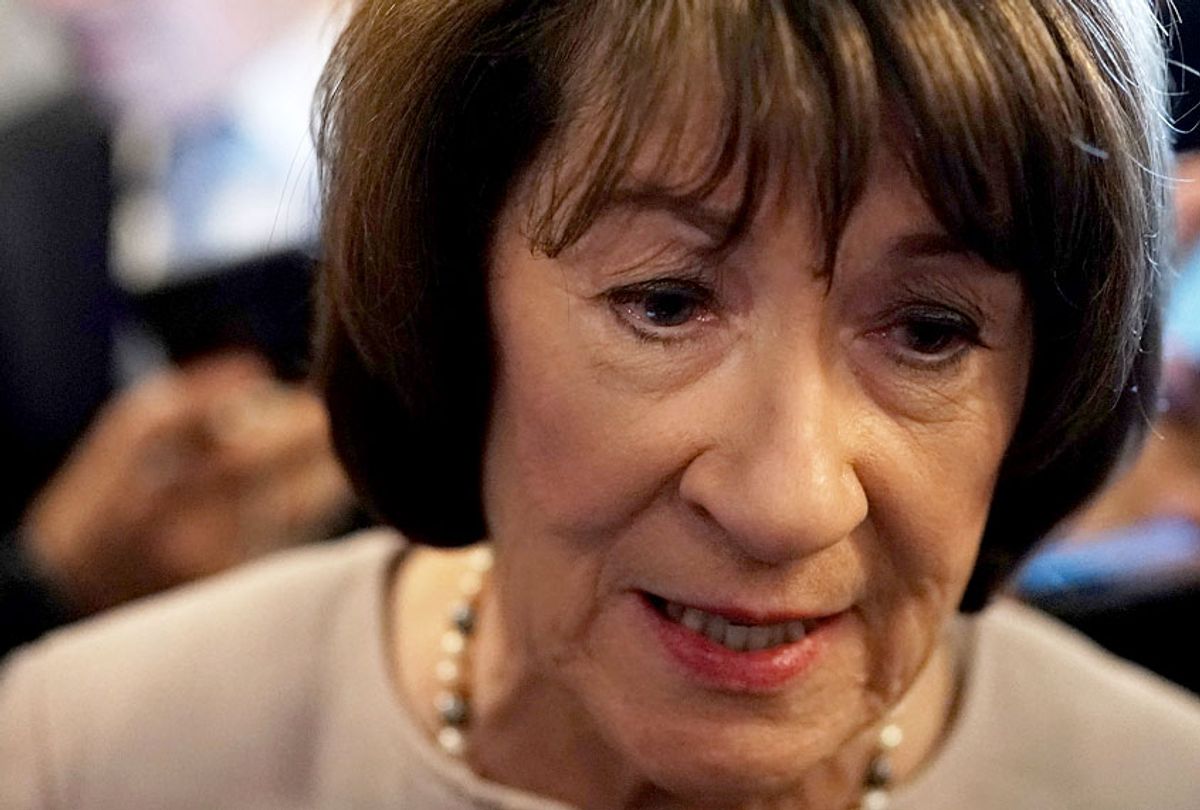Sen. Susan Collins, R-Maine, dodged questions about whether she voted for President Donald Trump in Maine's Republican primary despite vowing not to vote for him in 2016.
Collins, who is one of the most vulnerable Republicans facing re-election this fall, declined to say who she voted for ahead of Maine's primary on Tuesday in an interview with WCSH-TV over the weekend.
"Are you planning to vote in Tuesday's primary? And will you be supporting President Trump or writing in someone else as you did in 2016?" asked anchor Pat Callaghan on Friday.
Collins said only that she had already voted by absentee ballot.
"I would note that it's on the Democratic side that there are eight candidates, and my likely opponent, as well as the governor and many other Democratic officials, have not said who they are going to choose in what is a contested Democratic ballot," she said. "I'm focused on my job and also on my own campaign. And I'm just not going to get involved in presidential politics."
Trump is the only candidate on the Republican ballot after former Massachusetts Gov. Bill Weld failed to qualify for the primary, though voters can write in their own choice.
Collins was far more adamant about her vote in 2016, writing months ahead of the general election that she would not support Trump because of his "complete disregard for common decency."
"My conclusion about Mr. Trump's unsuitability for office is based on his disregard for the precept of treating others with respect, an idea that should transcend politics," she wrote in an op-ed at the time. "Instead, he opts to mock the vulnerable and inflame prejudices by attacking ethnic and religious minorities."
Collins added that she reached the "inescapable conclusion that Mr. Trump lacks the temperament, self-discipline and judgment required to be president."
Trump threw his support behind Collins during the impeachment fight in December and the president's campaign staff in Maine collected signatures to get her on the ballot for the state's Senate primary.
It is unclear how much that will help after Trump's disapproval rating in the state skyrocketed from 40% in January 2017 to 52% in January 2020, according to a Morning Consult poll.
Collins has attempted to play to the center amid a time of deepening partisan divisions since Trump took office. She backed Democrats in their fight to subpoena former national security adviser John Bolton's testimony in Trump's impeachment trial but later voted to acquit the president, claiming that he had learned a "big lesson" from the proceedings. Collins expressed "concern" about the allegations against Supreme Court Justice Brett Kavanaugh but later voted to confirm him. Collins, who says she is "pro-choice," also voted to confirm dozens of anti-abortion judges appointed by Trump.
Collins voted against the repeal of Obamacare, Trump's emergency border declaration, and Education Secretary Betsy DeVos' confirmation. Nonetheless, she has voted with Trump about 67% of the time.
But Collins' highly-visible role as a potential swing vote during a time of rank partisanship has not sat well with her voters. Collins is now the most unpopular senator in the country, beating out Senate Majority Leader Mitch McConnell, R-Ky., according to the latest Morning Consult tracking poll.
The visibility has led to an influx of out-of-state donors. Most of Collins' campaign contributions come from out of state, and dark money groups have flooded the airwaves with ads supporting her campaign. A mysterious company appears to have been set up in Hawaii for the sole purpose of funneling $150,000 to a pro-Collins PAC late last year.
Democratic groups have also responded by pouring a ton of money into the race, hitting Collins over her support of Kavanaugh and her support for the 2017 Republican tax cuts. Whoever wins the Democratic primary will also benefit from millions raised in a crowdfunding campaign in response to Collins' vote for Kavanaugh.
And those Democratic efforts appear to be working. Collins, who won her election by nearly 40 points, fell to a virtual tie with Maine House Speaker Sara Gideon, the leading Democrat in the race, in the latest Colby College survey after polls showed her 16 points ahead last year.
Dan Shea, the chair of the government department at Colby College, told Maine Public Radio that independent voters have increasingly been turned off by her vote to acquit Trump.
"Collins' brand has been one of moderation, fiscally conservative and socially liberal. She's pragmatic. She's secular," he said. "That brand of moderate Republican doesn't fit well with the rest of the Republican world — the larger national Republican world that is being led by President Donald Trump and U.S. Sen. Mitch McConnell."
However, her vote for Kavanaugh could have been the most pivotal. Collins won previous races with support from more than 60% of women, but the latest poll shows her disapproval skyrocketing to 65% among women.
"The bigger number, which I think is really important, is only 25% of women under 50 now have a favorable view Sen. Collins," he added. "She will not win reelection if she only has the support of 25% of women under 50."

Shares